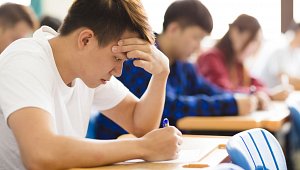It is a sad fact that a great many cases of plagiarism are committed by fellow students that you know and might even consider close friends. As the vast majority of essays and college or university projects are created digitally, most assignments can be copied very easily, with just a couple of mouse clicks. It's also true that many students will happily loan their laptops to one another or leave them unattended in classrooms, lecture halls or libraries. Under these circumstances, it's not surprising that once in a while, perfectly innocent students find that they're being accused of allowing others to copy their work when in fact they have done no such thing.
It should go without saying that if you suspect someone has plagiarised your work, then no matter how close a friend they might be, it is your responsibility to report their transgression the moment you become aware of it. Sadly, in many cases, the first a student hears about their work being compromised is when they're being summoned by their university or college to appear in front of an Academic Misconduct Panel. Naturally, this can be enormously stressful and can come as such a terrible shock that many students feel completely unable to deal with it.
Prevention is better than cure...
Before we get to what we can do to help you, we think it’s worthwhile mentioning a couple of pointers to prevent your work being plagiarised in the first place.
- Unless you're absolutely 100% sure you can trust them, don't lend your laptop to fellow course students, or if you do, maybe lock your essays in a password-protected folder.
- Don't leave hard copies of your assignments lying around unattended anywhere they can be copied.
Remember, if you are accused of collusion in an act of plagiarism, you could be penalised with as much severity as the person who actually did the copying and this could lead to a black mark on your record as a student, a lower mark for your course or degree or in a worst-case scenario, expulsion.
In cases where you are wholly innocent and you still find yourself accused of wrong-doing, it is crucial that you defend your position as diligently and effectively as possible.
If you have been accused of complicity, how can Match Solicitors help?
The first thing we are able to do at Match Solicitors is take the pressure off. If you're wholly innocent and have just been summoned out of nowhere to appear before a misconduct panel, your temptation might be to panic and assume all is lost. What we will do at Match Solicitors is help you build your defence by gathering evidence and helping you to prepare a solid, professional and eloquent defence.
Over the years, our team of dedicated education lawyers have represented hundreds of students in your exact situation and have been able to use expert knowledge of Academic Misconduct hearings and the law surrounding plagiarism to overturn a great many erroneous allegations.
Therefore, if you have been wrongly implicated in an act of plagiarism, call us at Match Solicitors today and we can help you prove your innocence and get on with your course with your reputation intact.




